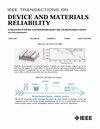LTPS TFT 中取决于作为 PV 的 SiO2 和 Si3N4 沉积顺序的沟道长度的特性和可靠性
IF 2.3
3区 工程技术
Q2 ENGINEERING, ELECTRICAL & ELECTRONIC
IEEE Transactions on Device and Materials Reliability
Pub Date : 2024-04-01
DOI:10.1109/TDMR.2024.3379743
引用次数: 0
摘要
本研究调查了作为 LTPS TFT PV 的 Si3N4 和 SiO2 沉积序列在不同沟道长度上的特性。在分析了初始条件下的亚阈值摆幅(SS)以及 NBTI 和 PBTI 操作之后的 $Delta \text{V}_{text\{TH}}$ 变化之后,确定了一种退化机制。当 Si3N4 作为第一层钝化 (PV) 沉积时,由于活化或热退火,氢会扩散到沟道中。在以 Si3N4 作为第一层钝化层的器件中,随着沟道长度的减少,沟道中心的氢浓度会增加。短沟道器件中心氢浓度升高会导致 SS 退化。此外,较正的固定氧化物电荷会在 NBTI 工作后产生更明显的降解。另一方面,由于捕获电荷较少,随着沟道长度的减少,PBTI 性能的劣化程度较轻。最后,使用 SIMS 验证了氢浓度。总之,NBTI 性能随器件缩放而降低的原因是 Si3N4 薄膜沉积过程中沟道中心的氢过量。氢分布不均也是导致不同通道长度的 PBTI 工作后出现不同 SS 和不同降解的原因。本文章由计算机程序翻译,如有差异,请以英文原文为准。
The Characteristics and Reliability With Channel Length Dependent on the Deposited Sequence of SiO₂ and Si₃N₄ as PV in LTPS TFTs
This study investigates the characteristics on different channel lengths for a sequence of Si3N4 and SiO2 deposition as PV of LTPS TFTs. After analyzing the subthreshold swing (SS) of the initial condition and change in the
$\Delta \text{V}_{\text{TH}}$
after NBTI and PBTI operations, a degradation mechanism is identified. When Si3N4 is deposited as the first layer of passivation (PV), hydrogen diffuses into the channel owing to activation or thermal annealing. As the channel length decreases, the hydrogen concentration increases at the center of the channel for devices with Si3N4 as the first layer of PV. Elevated hydrogen concentrations in the center of short channel devices lead to a debased SS. Moreover, the more positive fixed oxide charges create a more pronounced degradation after NBTI operation. On the other hand, PBTI performance shows a milder degradation with decreasing channel length due to fewer trapping charges. Finally, the hydrogen concentration is verified using SIMS. In summary, the heightened degradation of NBTI with device scaling is attributed to excess hydrogen on channel center during Si3N4 film deposition. The uneven hydrogen distribution also contributes the different SS and the different degradation after PBTI operation with different channel length.
求助全文
通过发布文献求助,成功后即可免费获取论文全文。
去求助
来源期刊

IEEE Transactions on Device and Materials Reliability
工程技术-工程:电子与电气
CiteScore
4.80
自引率
5.00%
发文量
71
审稿时长
6-12 weeks
期刊介绍:
The scope of the publication includes, but is not limited to Reliability of: Devices, Materials, Processes, Interfaces, Integrated Microsystems (including MEMS & Sensors), Transistors, Technology (CMOS, BiCMOS, etc.), Integrated Circuits (IC, SSI, MSI, LSI, ULSI, ELSI, etc.), Thin Film Transistor Applications. The measurement and understanding of the reliability of such entities at each phase, from the concept stage through research and development and into manufacturing scale-up, provides the overall database on the reliability of the devices, materials, processes, package and other necessities for the successful introduction of a product to market. This reliability database is the foundation for a quality product, which meets customer expectation. A product so developed has high reliability. High quality will be achieved because product weaknesses will have been found (root cause analysis) and designed out of the final product. This process of ever increasing reliability and quality will result in a superior product. In the end, reliability and quality are not one thing; but in a sense everything, which can be or has to be done to guarantee that the product successfully performs in the field under customer conditions. Our goal is to capture these advances. An additional objective is to focus cross fertilized communication in the state of the art of reliability of electronic materials and devices and provide fundamental understanding of basic phenomena that affect reliability. In addition, the publication is a forum for interdisciplinary studies on reliability. An overall goal is to provide leading edge/state of the art information, which is critically relevant to the creation of reliable products.
 求助内容:
求助内容: 应助结果提醒方式:
应助结果提醒方式:


